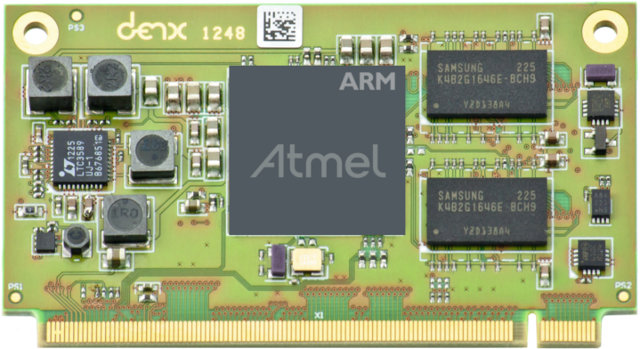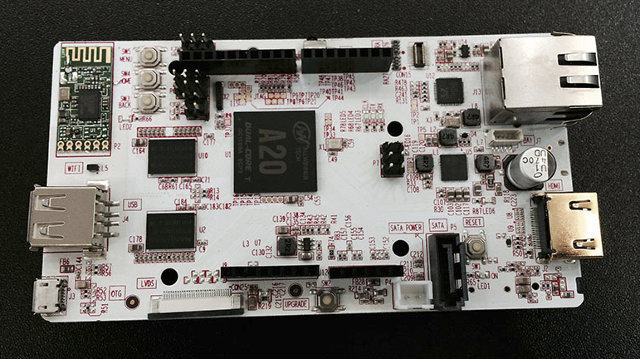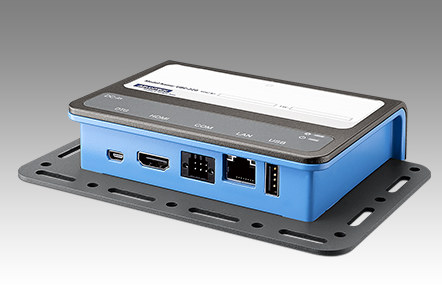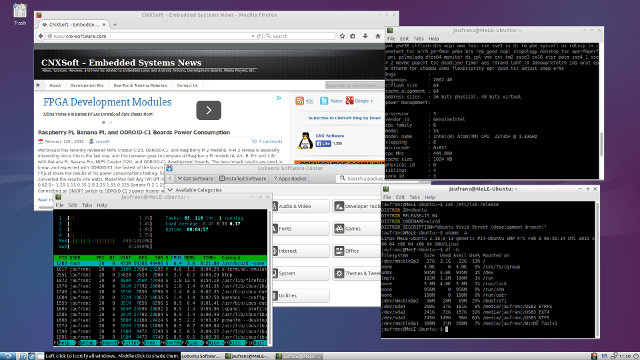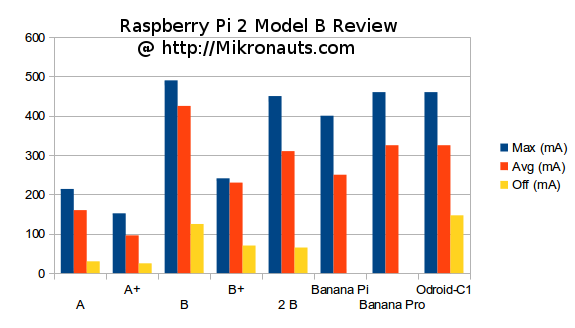Embedded World 2015 exhibition and conference will take place in Nuremberg, Germany on February 24-26, 2015, and we should expect interesting news related to MCU, industrial processors, and related development kits and boards next week. DENX Computer Systems has already unveiled two new SoM families with MA5D4 based on Atmel SAMA5D44 Cortex A5 processor, and M6R based on Freescale i.MX 6 Cortex A9 processors. DENX MA5D4 System-on-Module MA5D4 SoM specifications: Processor – Atmel SAMA5D44 Cortex A5 @ 528MHz with 720p hardware video decoder supporting H264/263, VP8, JPEG. System Memory – 128 – 512MB DDR2 RAM Storage – 4 – 32GB eMMC Flash (or optionally 256MB NAND Flash); 4 MB MByte SPI NOR-Flash; I/Os via 230-pin MXM2 edge connector Video Out / Display Support – HDMI. TFT controller, overlay support for image composition, resitive Touchscreen controller Camera – CMOS image sensor interface external bus A/D 25/16 bit 2x 10/100MBit Ethernet, IEEE1588 […]
Toucan-0700 HMI Panel Runs Linux or Android on Freescale i.MX6 Processors
TechNexion Toucan-0700 is an HMI (Human Machine Interface) panel based on Freescale i.MX6 modules and a baseboard following EDM standard for system-on-modules. The 7″ panel PC features the same EDM1-CF-IMX6 SoM used in Wandboard development boards, and runs various Linux distributions, as well as Android 4.3 or 4.4. Toucan-0700 specifications: SoC – Freescale i.MX6 Solo/Duallite Cortex A9 processor with Vivante GPUs (i.MX6 Dual/Quad on request) System Memory – 512MB (Solo), 1GB (Duallite) Storage – 4GB eMMC + micro SD slot Display – 7″ LCD display with LED backlight, 1024×600 resolution; 16M colors; 500 cd/m²; 4 points touchscreen Video Output – HDMI 1.4 for external display Connectivity – Gigabit Ethernet with POE function 802.3at, and optional WiFi 802.11 b/g/n + Bluetooth 4.0 (Broadcom BCM4330) USB – 1x USB 2.0 host port, 1x USB OTG 3.0 connector, 2x internal pin headers Serial – 1x RS-232 (galvanic isolated), 1x RS-232/422/485 (galvanic isolated), 2x […]
pcDuino3B Development Board Adds Gigabit Ethernet Support
pcDuino3 development board features Allwinner A20 dual core Cortex A7 SoC with support for SATA, HDMI, LVDS, Wi-Fi, Fast Ethernet, and Arduino compatible headers. Linksprite has now an updated version of the board that adds Gigabit Ethernet, while leaving the rest of the specs unmodified. pcDuino3B (aka pcDuino V3B) specifications: SoC – AllWinner A20 dual core ARM Cortex A7 @ 1.0 GHz, with Mali 400MP2 GPU System Memory – 1GB DRAM Storage – 4GB NAND Flash, SATA connector, and microSD card slot (up to 32GB) Video Output – HDMI 1.4 with HDCP support, LVDS header Audio Out – 3.5mm analog audio interface, I2S stereo digital audio interface Connectivity – Gigabit Ethernet, 802.11 b/g/n WiFi USB – 1x USB host, 1x USB OTG Expansion Headers – Arduino UNO extension interface with 14xGPIO, 2xPWM, 6xADC, 1xUART, 1xSPI, 1xI2C. Camera – MIPI camera support Misc – IR receiver Power – 5V, 2000mA, support […]
HiSilicon D02 Server Board Supports up to 64 ARM Cortex A57 Cores
HiSilicon has showcased their latest server SoC and board at Linaro Connect Hong Kong 2015, with up to two processors with 32 Cortex A57 cores @ 2.1GHz, 8 DIMM DDR3 slots (up to 128 GB RAM), 12 SATA ports, 4 PCIe slots, 10GbE / GbE ports. D02 board specifications: SoC – Hisilicon PhosphorV660 Hip05 with 16 to 32 ARM Cortex-A57 cores @ up to 2.1GHz and 1MB L2 cache/cluster, 32MB L3 cache System Memory – 2x Memory channel 4x DDR3 DIMM(4x DIMM per processor) Storage 12x SAS 3.0 ports @ 12 Gbps (8 for the first processor, 4 for the second). SAS port are compatible with SATA drives. You may want to read SAS vs SATA post for more details about SAS. 2x SPI Flash 158Mb BIOS/UEFI 1Gb NorFlash Connectivity – 2×10/100/1000Mbit/s Gigabit Ethernet ports, 2x xGE SFP+ ports (10Gb/s) Expansion – 2x 8x PCI express interfaces per processor (4 […]
Advantech UBC-220 Freescale i.MX6 RISC Compact Box Is Made for Wall-Mounting
If somehow you need a fanless ARM Linux / Android computer with lots of mounting holes, Advantech UBC-220 might be what you are looking for. The company’s “Freescale i.MX6 RISC Compact Box” features a Freescale i.M6 Solo or DualLite processor with up to 1GB RAM, 4GB eMMC, Gigabit Ethernet, HDMI and LVDS, a COM port, and more. Product specifications: SoC – Freescale i.MX6 Solo/DualLite up to 1GHz with Vivante GPU System Memory – 512MB to 1GB DDR3 @ 1066 MHz Storage – 4GB eMMC for OS, 4MB SPI flash for Advantech bootloader, 1x SD card slot Video Output / Display – 1x HDMI, 1x 18/24-bit LVDS Connectivity – Gigabit Ethernet (limited to 470Mbps due to i.MX6 internal limitation). Optional 3G/Wi-Fi via mini-PCIe slots. External antenna connector included. USB – 1x USB 2.0 type A, 1x micro USB 2.0 OTG Serial – 1x 4-wire UART Expansion 1x full size mini PCIe […]
How To Install Ubuntu 15.04 on MeLE PCG03 Intel Mini PC
I’ve already spent some time to test MeLE PCG03 Bay Trail-T mini PC in Windows 8.1, including a detailed video and audio review in Kodi 14.1. Since I don’t have anything else to do with Windows on the machine, I’ve decided to install Ubuntu instead, completely wiping out Windows 8.1. Since you pay around $30 for the Windows license, MeLE PCG03 is not the ideal platform computer for this little exercise due to the extra cost, but it should also work with other Intel Atom Z3735F based computer that may not come with a license. At first I planed to go with Ubuntu 14.10 Mate ISO image, and it boots fine, but was curious to try from “scratch” with another ISO, so I went with Ubuntu 15.04 Alpha 2 (64-bit) image. I just went to the first link Google Search provided me and did not pay attention enough, and ended-up […]
Raspberry Pi, Banana Pi, and ODROID-C1 Boards Power Consumption
Mikronauts has recently reviewed MIPS Creator CI20, ODROID-C1, and Raspberry Pi 2 Model B. R-PI 2 review is especially interesting since this is the last one, and the reviewer goes to compare all Raspberry Pi models (A, A+, B, B+ and 2 B) with Banana Pi, Banana Pro, MIPS Creator CI20, and ODROID-C1 development boards. The benchmark results are good to know, and expected with ODROID-C1 the fastest of the bunch both in terms of CPU and storage performance, but here I’ll just share the results of his power consumptions testing. Since all platforms are powered by a 5V power supply, I’ve converted the results into watts. Model Max (W) Avg (W) Off (W) A 1.07 0.80 0.15 A+ 0.76 0.48 0.125 B 2.45** 2.12 0.62 B+ 1.20 1.15 0.35 2 B 2.25 1.55 0.325 Banana Pi 2 1.25 0 Banana Pro 2.3 1.62 0 Odroid-C1 2.3 1.62 0.735* * […]
Ingenic Halley is a $20 Linux based IoT Board with Wi-Fi and Bluetooth 4.1 Connectivity
Ingenic introduced Newton2 platform for wearables a few months ago, and the kit with an AMOLED display, camera board and other accessories should go on sale in March for $80. In the meantime, the company has also been working on a lower cost internet of things (IoT) module and development kit powered by Ingenic M150 with Wi-Fi and Bluetooth 4.1 targeting smart appliances, Wi-Fi speakers, smart toys, industrial control applications, and other smart devices. Halley IoT module specifications: SoC – Ingenic M150 XBurst (MIPS) single-core processor up to 1.0GHz with 128MB LPDDR on-chip, 2D graphics GPU, VPU supporintg 720p30 H.264 video decoding. Storage – 8MP SPI NOR flash (GIGA GD25LQ64) Connectivity – Wi-Fi 802.11 b/g/n and Bluetooth 4.1 via Broadcom 43438 chip. Expansion headers (2mm pitch) 8-bit parallel LCD interface, Audio – MIC, Line-In and headphone, 2x I2S, SD card (MMC interface) USB device 2.0, and USB host 1.1 3x […]


